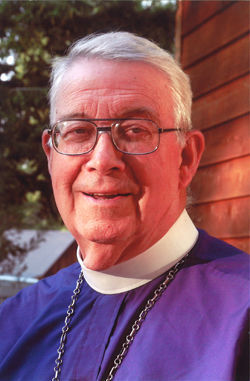Rustin “Rusty” Kimsey, retired Episcopalian priest and bishop and lifelong promoter of tolerance and social justice, died at home in The Dalles April 10 after a short illness. He was 79.
He was a priest at St. Paul’s Episcopal Church in The Dalles from 1971 until he was named Bishop of the Diocese of Eastern Oregon in 1980, and moved its offices from Bend to The Dalles.
He retired as bishop in 2000, though he later did two year-long stints as Assisting Bishop, once to serve “Navajoland” and once in Alaska.
Two memorial services for Kimsey are planned:
• Next Friday, April 25, at 8 p.m. will be a compline and vigil at St. Paul’s Episcopal Church, 1805 Minnesota St.
• On Saturday, April 25, a service of thanksgiving for his life and ministry begins 11 a.m. at Calvary Baptist Church, 3350 Columbia View Dr. Following a luncheon, the burial will take place at the Dufur Cemetery.
Kimsey, a sixth-generation Oregonian, enjoyed an active life of outdoor pursuits and volunteerism. He loved camping and fishing, and was involved in a variety of community pursuits, ranging from helping to establish mental health programs to sitting on the Columbia River Gorge Commission and serving on the advisory board for Haven from Domestic Violence.
Something special about Kimsey that his wife, Gretchen, always admired was his ability to connect with people within minutes of meeting them.
“He loved people and they knew that and they opened up to him right away,” she said.
“They didn’t feel invaded, they felt invited into the conversation and so they would share.”
Rusty was raised in the Episcopal church and knew he wanted to be a priest early on, Gretchen said. “He devoted his life to the church, really.”
Kimsey attended seminary in Boston following graduation from the University of Oregon in 1957 with a degree in history.
“He was deeply influenced as a young man by some wonderful priests” where he grew up, in Hermiston and Bend, and at Ascension School Camp, in Cove,” said Gretchen.
“I think they planted the seed in him, ‘You know Rusty, you would make a wonderful priest, you should consider that.’”
He attended the Episcopal Theological School and quipped that he went to Boston because he loved the Red Sox, Gretchen said.
His father had been on a farm team for the Red Sox in the 20s and 30s.
Son Sean described his father as “a very balanced man. He was very present and very sensitive to all manner of things having to do with being a father.”
The elder Kimsey wasn’t into team sports, but was very competitive at tennis and golf.
He came from pioneer stock and was very much “a man’s man” who could be found “standing around a truck at 6 a.m. taking a sip from a bottle of hooch with his friends.”
He supported allowing women to become priests long before it was fashionable, and also supported gay rights, not only their rights as people, but their place in the church, Sean said.
One of his father’s greatest achievements in the House of Bishops from 1994 to 2000 was chairing a commission that established full communion between the Evangelical Lutheran Church in America and the Episcopal Church.
Sean said one of his father’s laments was the diminishing role of the church in America.
Sean lauded his parents for giving him and his sister a grounded view of the church. He said they did that not only by example, but by the people they chose to surround themselves with.
“People gravitated to him,” Sean said.
“You’re going to see an amazing array of people” at the services, he said. “All the different friends from all walks of life and people that dad has touched through the years.”
When he worked with the Navajos, Gretchen said Rusty learned to cook meatloaf and that became his menu specialty.
But overall he “appreciated me cooking and he always said thank you for dinner. Even during the illness when he couldn’t eat, he’d say thank you for a spoonful of yogurt,” Gretchen said. “That describes the essence of the man.”























Commented